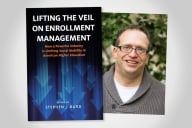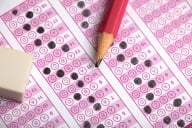You have /5 articles left.
Sign up for a free account or log in.
U.S. News & World Report announced last week that it would change how it ranks law schools in response to the decision by many top law schools to no longer participate in the ranking process. However, it is unclear whether the changes will lead law schools to accept (or even participate in) the new process.
A letter to law school deans Monday from Robert Morse, chief data strategist at U.S. News & World Report, and Stephanie Salmon, senior vice president for data and information strategy, said, “For schools that do respond [to the request to participate], we will publish more detailed profiles, enabling students to create a more comprehensive picture of their various choices. For the rankings portion, there will be some changes in how we weight certain data points, including a reduced emphasis on the peer assessment surveys of academics, lawyers and judges, and an increased weight on outcome measures.”
Their letter explained, “Some law schools that are able to offer fellowships felt they were being undervalued, thus discouraging public service careers. For the next year, we will be giving full-weight to school-funded full-time long-term fellowships where bar passage is required or where the JD degree is an advantage, and we will treat all fellowships equally. We will also be giving full-weight to those enrolled in graduate studies in the [American Bar Association] employment outcomes grid.”
The authors said the publication was also working on changes in other areas.
“The conversations revealed other factors, such as loan forgiveness/loan assistance repayment programs, need-based aid, and diversity and socio-economic considerations, which will require additional time and collaboration to address. In these areas we will continue to work with academic and industry leaders to develop metrics with agreed upon definitions,” said the letter.
“More data benefits everyone,” the letter said. “To that end, we plan to make available to students more of the data we already have collected so that they can run deeper comparisons among law schools. Similarly, we call on all law schools to make public all of the voluminous data they currently report to the ABA but decline to publish, so that future law students can have fuller and more transparent disclosure.”
The letter did not indicate that any changes would be made to the rest of its rankings. Some of the complaints about the rankings, in particular about the peer-assessment surveys, have focused on the main undergraduate rankings as well.
Will the Critics Be Satisfied?
It is unclear whether the changes will satisfy the many critics of the magazine.
Yale Law’s dean, Heather K. Gerken, who started the movement not to participate in the rankings, said in a statement that “having a window into the operations and decision-making process at U.S. News in recent weeks has only cemented our decision to stop participating in the rankings.”
Harvard Law School said it wouldn’t comment at this time. Harvard and Yale were the first law schools to announce that they were leaving the magazine’s rankings.
Duke University said that it had nothing new since it released the statement of Kerry Abrams, its law dean, withdrawing from the rankings. And a spokesman for the University of Michigan law school said there has been no change in its position (abandoning the rankings).
Those four law schools are all ranked highly by U.S. News every year. But the rankings also affect other law schools. And the signs from a broader range of law schools aren’t encouraging for U.S. News.
Megan Carpenter, dean of University of New Hampshire’s Franklin Pierce School of Law, issued a statement that said, “The announcement from U.S. News about its intended modifications is too little, too late, and too vague. For years, law school deans and a host of other observers have raised concerns with U.S. News about its monolithic ranking system and its outsized negative influence on law school education with little substantial change.”
She added, “We should be very concerned that the conversation about the diminished credibility and legitimacy of the U.S. News ranking, initiated by the 20-plus law schools including UNH Franklin Pierce, simply devolves into an exercise about tweaking their monolithic formula.”
Aaron N. Taylor, executive director of AccessLex Institute Center for Legal Education Excellence, said, “It is remarkable the speed at which the opt-outs prompted U.S. News to respond. It took only weeks to address issues they’ve been hearing about for years. This seems to highlight how worried they are about a mass defection by law schools.”
He added, “The letter to deans, while light on specifics, does put forth modifications that could be useful. Reducing the weight of the peer-assessment surveys is a no-brainer and is something that should have been done long ago. Increasing the weight of outcomes will likely be welcomed by many. I was disappointed to see the continued absence of a diversity metric in the core methodology. I was encouraged, however, to see that U.S. News will make more data available to its subscribers to allow for more nuanced comparisons.”








